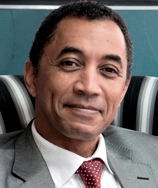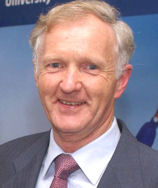Prof Derrick Ian Swartz (2008 - 2017)
 Prof Derrick Swartz served as the Vice-Chancellor of Nelson Mandela University from 2008 to 2017.
Prof Derrick Swartz served as the Vice-Chancellor of Nelson Mandela University from 2008 to 2017.
Originally from Port Elizabeth, Prof Swartz began his working life as a high school teacher, community researcher, and project coordinator in the city’s northern areas. A strident anti-Apartheid activist, he helped build a network of youth community organisations in the region that led to the formation of the United Democratic Front (UDF).
During the early 1990s he worked and studied in the United Kingdom, where he made significant contributions to thinking around democratic governance and the management of a post-apartheid civil service in South Africa. Prof Swartz has a BA degree from the University of the Western Cape, and MA and DPhil degrees in sociology from Essex University.
He is the former Vice-Chancellor and Principal at Fort Hare University, where he is credited for leading a profound turnaround strategy. He founded the Institute of Government in 1995 and served as Professor and Chair of Inter-Governmental Relations.
A sociologist by training, Prof Swartz has played a leading role in transformation and change management in South African higher education in recent years and has actively contributed to change in South African society on a wide front. He was a member of a presidential review commission appointed by then President Nelson Mandela and has served on several boards and public trusts and as a board member of the Association of Commonwealth Universities.
Prof Swartz has played a leading role in transformation and change management in South African higher education in recent years and has actively contributed to change in South African society on a wide front. He was a member of a presidential review commission appointed by then President Nelson Mandela to investigate the functioning of the South African public service in 1996/97. He is a member of the Liliesleaf (Rivonia) Trust, Freedom Park Trust, and the board of Higher Education South Africa, and has served on the SABC Board. He has served on a strategic advisory team for the Eastern Cape Premier and as a board member of the Association of Commonwealth Universities.
He has written a book in collaboration with two other authors, has published extensively in a number of journals and books and has delivered papers across the globe as well as contributing to many commissioned reports.
His areas of special interests are the role of universities in the economy, the philosophy of science, and the developmental role of higher education
During his free time, of which there is very little, he enjoys reading, swimming and listening to classical music.
Prof Rolf Heinrich Stumpf (First Vice-Chancellor and CEO of NMMU)
 Rolf Heinrich Stumpf was born in 1945 in the town of Vryheid, KwaZulu Natal. After completing his schooling in Vryheid and Pietermaritzburg, he enrolled for a degree in Mathematics & Statistics at the University of Pretoria and graduated with a BA (cum laude) in 1967. He continued with his studies in statistics whilst lecturing at the University of Pretoria, receiving a BA Hons (cum laude) in 1969 and an MA (cum laude) in 1972. In 1974, whilst studying full-time and lecturing part-time, he completed a Diploma in Theology (cum laude) at the Baptist College of SA in Johannesburg. He was awarded his PhD in Statistics (Analysis of Qualitative Data) from the University of South Africa in 1984.
Rolf Heinrich Stumpf was born in 1945 in the town of Vryheid, KwaZulu Natal. After completing his schooling in Vryheid and Pietermaritzburg, he enrolled for a degree in Mathematics & Statistics at the University of Pretoria and graduated with a BA (cum laude) in 1967. He continued with his studies in statistics whilst lecturing at the University of Pretoria, receiving a BA Hons (cum laude) in 1969 and an MA (cum laude) in 1972. In 1974, whilst studying full-time and lecturing part-time, he completed a Diploma in Theology (cum laude) at the Baptist College of SA in Johannesburg. He was awarded his PhD in Statistics (Analysis of Qualitative Data) from the University of South Africa in 1984.
During the latter part of his study years, Rolf Stumpf held a position as a University Planner in the Department of National Education and then took up a position as Senior Research Specialist at the Human Sciences Research Council (HSRC). In 1985, he once again joined the Department of National Education where in 1989 he was appointed Deputy Director-General responsible for all facets of education policy development, including higher education. He returned to the HSRC in 1993 when he was appointed as its Chief Executive Officer.
His passion for higher education took him back into academia and in 1998 Stellenbosch University appointed him as Vice-Rector (Operations) and in 2000, as Vice-Rector (Teaching). Taking his career a step further, and moving on to Port Elizabeth, he was appointed as Vice-Chancellor and CEO of the University of Port Elizabeth (UPE) on 1 April 2002. With the merger of UPE, the PE Technikon and Vista University’s PE campus, he became the Interim Vice-Chancellor of the Nelson Mandela Metropolitan University (NMMU). In September 2005, he was appointed as the university’s first Vice-Chancellor and CEO.;
Dr Stumpf served amongst others as Executive Officer of the Universities and Technikons Advisory Council (AUT), the SA Council on Education, and the Scientific Advisory Council, while he also chaired the Education Labour Relations Council in 1993 and 1994. During 1995/1996 he was Chair of the Committee of Heads of Science Councils and a Commissioner in the National Commission on Higher Education (NCHE). He also served as a member of the Board of the Research and Technology Foresight Study of the Department of Arts, Culture, Science and Technology from 1997 to 1999 and was a member of the Council on Higher Education from 1998 to 2002.
He was a member of the Board of the Higher Education Quality Committee (HEQC) and was elected as a member of the Executive Committee of Higher Education SA (HESA). He was also a Trustee of the Centre for Higher Education Transformation (CHET) a member of the Academy of Science of SA and served on the Board of Directors of the PE Regional Chamber of Commerce.
Dr Stumpf was the author of a number of scientific articles in the field of statistics (qualitative data analysis) and co-author of a book on Graphical Exploratory Data Analysis. He also authored and co-authored a large number of policy reports in the field of education, especially in higher education. He has read numerous papers on higher education policy both nationally and internationally.
Dr Stumpf was Vice-Chancellor of Nelson Mandela Metropolitan University from 2006-2008.
He passed away in October 2020.